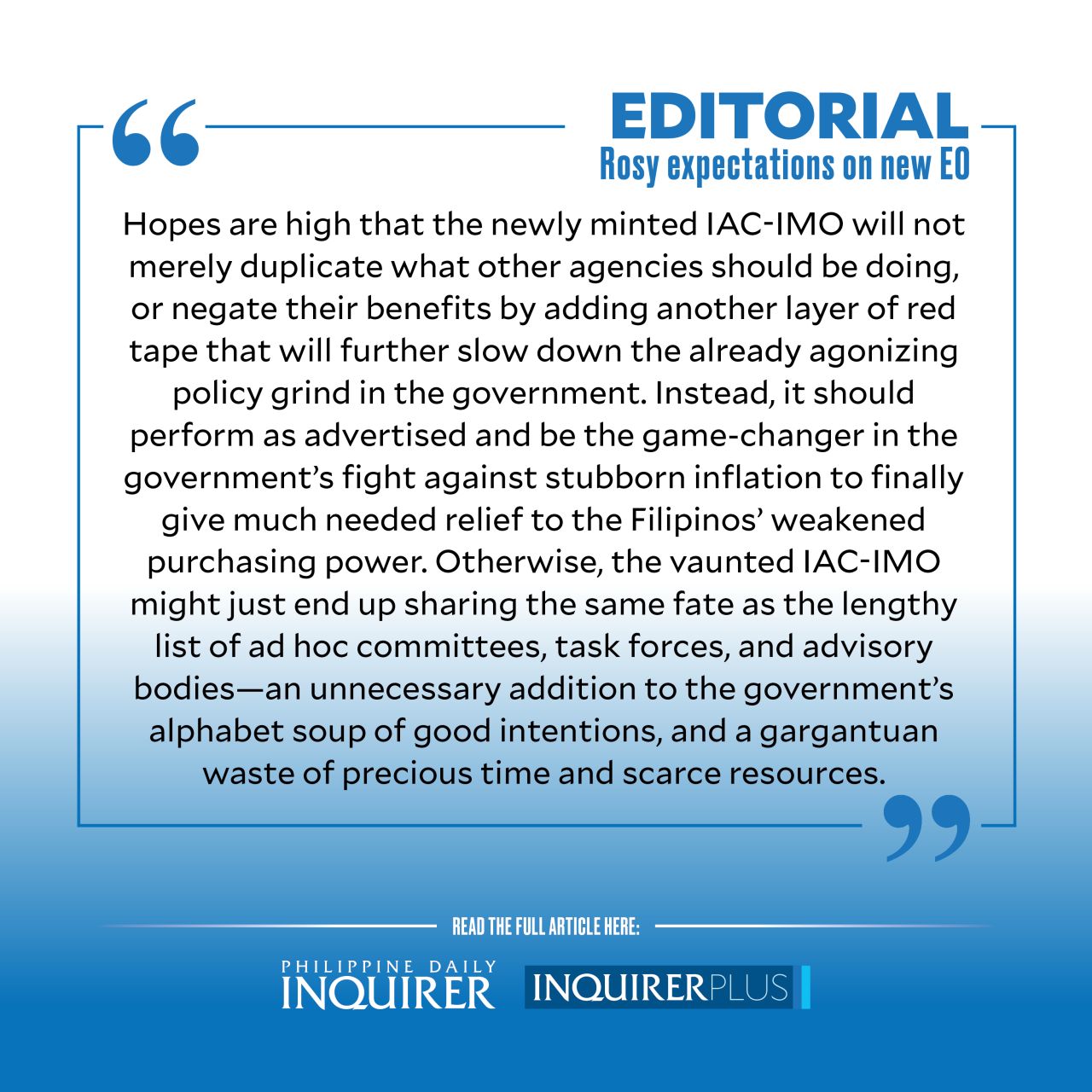Rosy expectations on new EO

Last week, President Marcos signed an executive order creating the Inter-Agency Committee on Inflation and Market Outlook (IAC-IMO), as part of government efforts to rein in inflation, or the unabated increase in the prices of basic goods and services, and keep the Philippine economy on track to full recovery.
On paper, the IAC-IMO sounds like a godsend to Filipinos struggling to cope with high prices that have forced them to make do with less. For one, the executive firepower behind it is impressive. Chaired by the secretary of the National Economic and Development Authority, it has the finance secretary as cochair and the budget secretary as vice chair. Completing the roster are the secretaries of agriculture, energy, science and technology, trade, and the interior. Together, the high level group will advise the Economic Development Cluster—now known as the Economic Development Group (EDG)—“on measures that would keep inflation, particularly of food and energy, within the government’s inflation targets.”
The EO is tasked “to directly address inflation, … strengthen the EDC, and reinforce existing government initiatives aimed to improve the economy and the quality of life of the Filipino people.” It will also closely monitor the main drivers of inflation; assess the supply-demand situation for essential food commodities during the cropping periods; assess the impact of natural and man-made shocks on the supply of key food commodities, and monitor the data necessary to assess food prices and the supply and demand situation.
The potentially powerful IAC-IMO will also ensure data sharing among concerned government agencies to “effect timely supply and demand situation analysis; monitor global, regional, and domestic developments and issues that may affect prices, and provide timely recommendations to the EDG and relevant agencies on measures to curb price spikes and promote food security based on ex-ante supply and demand analysis.” With relevant and timely data on hand, the IAC-IMO is expected to make better recommendations, for example, on whether there was a need to immediately import certain commodities such as sugar, rice, and meat because of projected shortages in two to three months to ward off any price spikes.
The timing of the EO issuance cannot be faulted given that, according to the latest study of OCTA Research, close to three of five Filipinos had cited inflation as the most urgent national concern that the government must address. Indeed, reining in inflation, closely followed by increasing salaries and wages and improving access to affordable food such as rice, vegetables, and meat, had overtaken containing the COVID-19 pandemic in the ranking of the major concerns among Filipinos today.
That inflation now ranks as top concern should not come as a surprise, as Filipinos can no longer buy the same goods for the same amount of money because of escalating prices. Inflation, however, decelerated to 6.6 percent in April 2023 from 7.6 percent the previous month, the lowest reading since August 2022, with the Bangko Sentral ng Pilipinas (BSP) expecting that price hikes would have slowed down in May due to lower prices of gas, poultry, and fish.
Reining in inflation, however, to target band of a low 2 to 4 percent by 2024, has come at a price: mainly the successive increases in the policy rate of the BSP, making it more expensive to take out bank loans and credit card debt. And expectations are that inflation will remain high this year because of a spike in food and energy prices, forcing the government to raise its inflation projections this year to 5 to 7 percent, from just 2.5 to 4.5 percent previously, which is above the yearend average in 2022 of 5.8 percent.
Again, this is no surprise because based on a separate study released in April by Pulse Asia, the Marcos administration is seen to have failed only in containing the surge in prices that have tightly squeezed household budgets, the only blemish on its high approval and trust ratings.
Given this perception, hopes are high that the newly minted IAC-IMO will not merely duplicate what other agencies should be doing, or negate their benefits by adding another layer of red tape that will further slow down the already agonizing policy grind in the government. Instead, it should perform as advertised and be the game-changer in the government’s fight against stubborn inflation to finally give much needed relief to the Filipinos’ weakened purchasing power.
Otherwise, the vaunted IAC-IMO might just end up sharing the same fate as the lengthy list of ad hoc committees, task forces, and advisory bodies—an unnecessary addition to the government’s alphabet soup of good intentions, and a gargantuan waste of precious time and scarce resources.




















